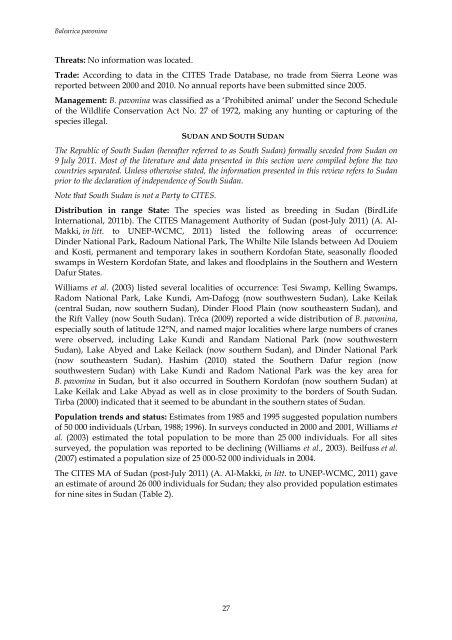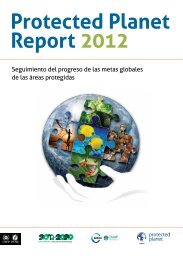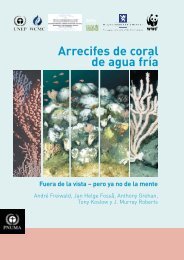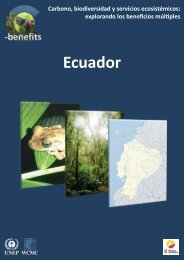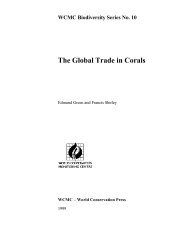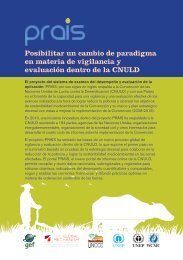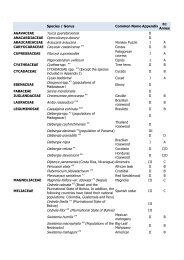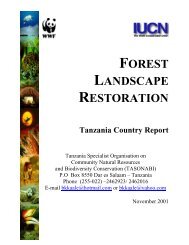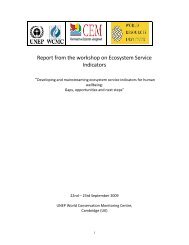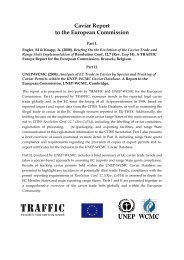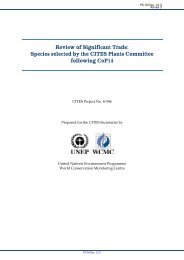2012. Review of Significant Trade - Cites
2012. Review of Significant Trade - Cites
2012. Review of Significant Trade - Cites
Create successful ePaper yourself
Turn your PDF publications into a flip-book with our unique Google optimized e-Paper software.
Balearica pavonina<br />
Threats: No information was located.<br />
<strong>Trade</strong>: According to data in the CITES <strong>Trade</strong> Database, no trade from Sierra Leone was<br />
reported between 2000 and 2010. No annual reports have been submitted since 2005.<br />
Management: B. pavonina was classified as a ‘Prohibited animal’ under the Second Schedule<br />
<strong>of</strong> the Wildlife Conservation Act No. 27 <strong>of</strong> 1972, making any hunting or capturing <strong>of</strong> the<br />
species illegal.<br />
SUDAN AND SOUTH SUDAN<br />
The Republic <strong>of</strong> South Sudan (hereafter referred to as South Sudan) formally seceded from Sudan on<br />
9 July 2011. Most <strong>of</strong> the literature and data presented in this section were compiled before the two<br />
countries separated. Unless otherwise stated, the information presented in this review refers to Sudan<br />
prior to the declaration <strong>of</strong> independence <strong>of</strong> South Sudan.<br />
Note that South Sudan is not a Party to CITES.<br />
Distribution in range State: The species was listed as breeding in Sudan (BirdLife<br />
International, 2011b). The CITES Management Authority <strong>of</strong> Sudan (post-July 2011) (A. Al-<br />
Makki, in litt. to UNEP-WCMC, 2011) listed the following areas <strong>of</strong> occurrence:<br />
Dinder National Park, Radoum National Park, The Whilte Nile Islands between Ad Douiem<br />
and Kosti, permanent and temporary lakes in southern Kord<strong>of</strong>an State, seasonally flooded<br />
swamps in Western Kord<strong>of</strong>an State, and lakes and floodplains in the Southern and Western<br />
Dafur States.<br />
Williams et al. (2003) listed several localities <strong>of</strong> occurrence: Tesi Swamp, Kelling Swamps,<br />
Radom National Park, Lake Kundi, Am-Dafogg (now southwestern Sudan), Lake Keilak<br />
(central Sudan, now southern Sudan), Dinder Flood Plain (now southeastern Sudan), and<br />
the Rift Valley (now South Sudan). Tréca (2009) reported a wide distribution <strong>of</strong> B. pavonina,<br />
especially south <strong>of</strong> latitude 12°N, and named major localities where large numbers <strong>of</strong> cranes<br />
were observed, including Lake Kundi and Randam National Park (now southwestern<br />
Sudan), Lake Abyed and Lake Keilack (now southern Sudan), and Dinder National Park<br />
(now southeastern Sudan). Hashim (2010) stated the Southern Dafur region (now<br />
southwestern Sudan) with Lake Kundi and Radom National Park was the key area for<br />
B. pavonina in Sudan, but it also occurred in Southern Kord<strong>of</strong>an (now southern Sudan) at<br />
Lake Keilak and Lake Abyad as well as in close proximity to the borders <strong>of</strong> South Sudan.<br />
Tirba (2000) indicated that it seemed to be abundant in the southern states <strong>of</strong> Sudan.<br />
Population trends and status: Estimates from 1985 and 1995 suggested population numbers<br />
<strong>of</strong> 50 000 individuals (Urban, 1988; 1996). In surveys conducted in 2000 and 2001, Williams et<br />
al. (2003) estimated the total population to be more than 25 000 individuals. For all sites<br />
surveyed, the population was reported to be declining (Williams et al., 2003). Beilfuss et al.<br />
(2007) estimated a population size <strong>of</strong> 25 000-52 000 individuals in 2004.<br />
The CITES MA <strong>of</strong> Sudan (post-July 2011) (A. Al-Makki, in litt. to UNEP-WCMC, 2011) gave<br />
an estimate <strong>of</strong> around 26 000 individuals for Sudan; they also provided population estimates<br />
for nine sites in Sudan (Table 2).<br />
27


